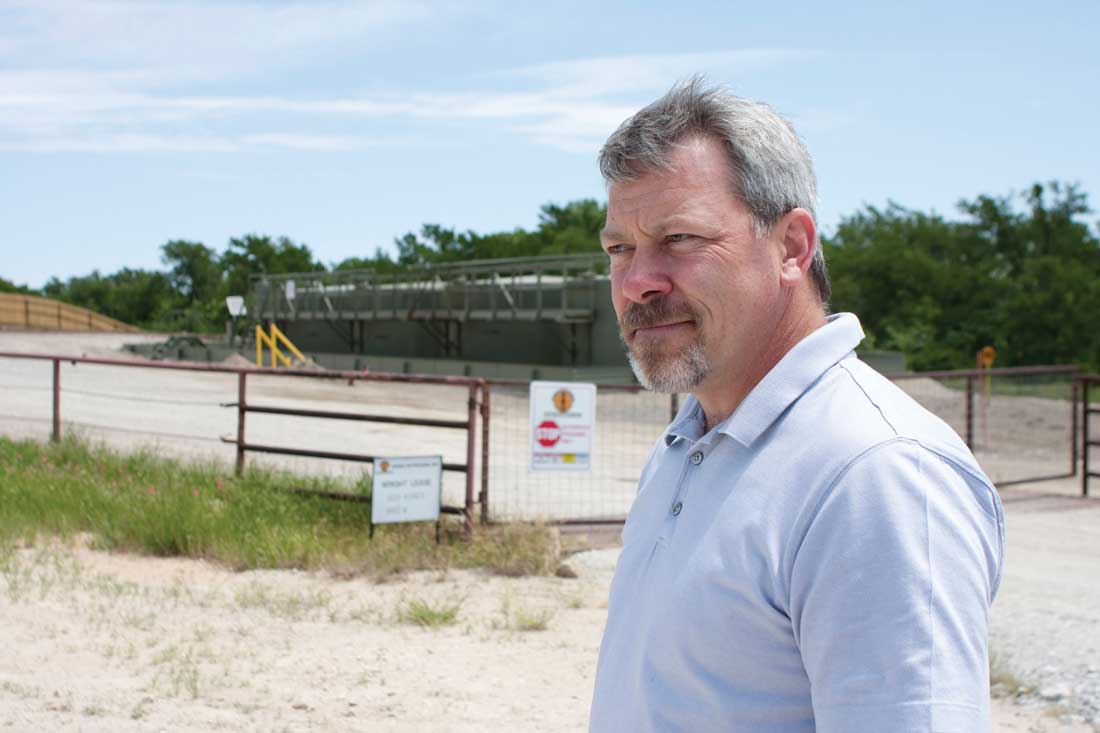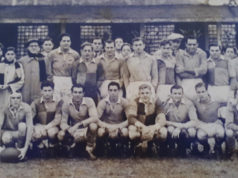A geologist who has spent years studying the effects of natural gas drilling on water sources said last week that he has “no doubt” that Range Resources gas drilling activity has contaminated the Trinity Aquifer, ruining several water wells in Parker County — but not due to leaks from the gas wells themselves.
Retired professor Geoffrey Thyne, who has worked as a consultant for gas drillers, gas drilling critics, and the Environmental Protection Agency, told Fort Worth Weekly he is convinced that natural gas, disturbed by the hydraulic fracturing process, is migrating through a natural fault into the aquifer. The Trinity aquifer serves as a primary water source for 20 counties, from the Oklahoma border south to Bandera.
Thyne is principal geochemist at Wyoming’s Science Based Solutions LLC, which investigates environmental impacts of industrial development on watersheds.
Since 2010, he said, the number of water wells affected — in some cases to the point that the water is so saturated with methane that it can be set on fire — has gone from one to five, and the five make a line that parallels a geologic fault in the area.
“Initially I was hopeful that this was stray gas that would dissipate in time,” Thyne said. Instead, the area of methane pollution of the aquifer “is getting bigger. It’s spreading geometrically. And it’s not the fault of a bad well,” he said. “The wells are very well done. This is coming from the rock that has been fracked, and it may be the first time we are actually seeing that.” The Barnett Shale strata lie several thousand feet below the level of the aquifer.
Not only has the number of affected wells grown, but the methane levels have risen, and the methane has a chemical signature that ties it back to the Range Resources fracking operation, he said.
“We have no way of knowing if it will get worse, but you cannot fix this,” he said. “And that makes it a game changer.”
Thyne’s remarks were in response to a report released recently by the Texas Railroad Commission. The commission said in the May 23 document that no conclusive evidence had been found connecting Range Resources’ two gas wells to the water well pollution. The commission oversees the oil and gas industry.
“There is no doubt in my mind that the Range Resources wells contaminated the water wells in Parker County,” Thyne said. “When you see gas in a water well, you can generally track it back to a gas well. Most gas wells leak a little. Most of that can be mitigated with some additional [concrete] in the gas well casing.
“But this case is unique. There is no indication the gas wells are leaking.”
The affected wells are in Weatherford. Steve Lipsky, owner of one of those wells, has gained a measure of celebrity for demonstrating, on film, that his well water can be set on fire.
Lipsky’s problems started in 2009, shortly after Range Resources fracked two natural gas wells near his property. He and several other nearby families said that their water wells had soured, and Lipsky himself began to suffer daily from nausea and headaches.
He attributed it to a possible gas buildup in his water well. After the problem literally reached the flammable point, he contacted the Railroad Commission. The agency required Range to run a series of tests on the water well.
Lipsky also contacted Alisa Rich of Wolf Eagle Environmental to test the water. Her tests showed high levels of methane, as did the Railroad Commission tests. Lipsky and his wife Shyla were told by the commission to stop using their well.
In late 2010, the Environmental Protection Agency also tested Lipsky’s well and shortly thereafter issued an emergency order that included a finding that Range Resources had “caused or contributed” to the contamination of the Lipsky water well and another nearby. The order directed Range to develop “a plan for EPA approval identifying gas flow pathways to the Trinity Aquifer, eliminating gas flow to the aquifer if possible, and remediating impacted areas of the aquifer.”
The EPA hired Thyne as an independent contractor to evaluate all the testing data. “I did a report saying that I thought the gas signature matched the water wells with the gas wells,” he said.
Ironically, Earthworks’ Oil and Gas Accountability Project had hired Thyne in 2005 to review an EPA study of fracking. His negative remarks about that study — related to a lack of data “to evaluate potential links between fracking and water quality” — led him to be excoriated by the gas industry.
The signature, Thyne explained, “is equivalent to a fingerprint, or unique pattern of 10 or so distinct parameters that are very similar or identical” in the detailed chemical makeup of the gas found in the water wells and that coming from Range’s operations.
But then the EPA backed off.
“The EPA settled and told me to drop it, and since [his work] was litigation support, that was the end of it,” Thyne said. “But I was still curious as to how Range got such a different conclusion than I had, so I continued to follow the case, analyzing data that came along.”
The EPA dropped the potential litigation against Range immediately after the Railroad Commission issued a report in March 2011 noting that “hydraulic fracturing can be ruled out as a potential source of natural gas in the Silverado neighborhood” where the Lipskys lived. The report instead suggested that the methane in the neighborhood’s water wells most likely came from gas migrating from the Strawn shale formation, which is much shallower than the Barnett Shale into which Range drilled.
The Railroad Commission got involved in the Lipsky case again in August 2013, at the request of the Lipskys and several neighbors, when the level of methane in their wells increased. New tests confirmed that in five of the nine water wells sampled, methane levels had risen.
However, in its most recent report, the commission still concluded that the data “are inconclusive as to a specific source of the gas.” The report said that “seismic reflection data submitted by Range Resources to the RRC do not show the presence of faults” that would allow gas to migrate into the Trinity Aquifer and thus into the water wells.
Thyne is certain that there is such a fault. “What we … have is that back in 2010, there was one well that had a serious problem. Now there are five, and they form a straight line, and that line is parallel to the fault system in the region … that is allowing the gas from the Barnett to seep up to the Trinity Aquifer,” he said.
Range Resources did not return calls for comment on this story.
Railroad Commission spokesperson Ramona Nye wrote in an e-mail that “Our staff could find no evidence that oilfield activity is the cause of methane contamination in the aquifer, and as a result no further investigation activities are currently planned … . [T]he physical data described in the commission’s report do not reveal pathways that could allow natural gas to migrate from the Barnett Shale (approximately 5,700 feet below ground) and into the residents’ water wells.”
Nathan Matthews, a staff attorney with the Sierra Club, disagreed. “To my knowledge, this is the first time the signature of the methane in the water is identical to the methane in a gas well in Texas,” he said. “We’ve seen it in Pennsylvania, but this is a first for Texas.”
Sharon Wilson, representative of the Texas Oil and Gas Accountability Project, posted the initial video of Lipsky’s well water being lit on fire on her BlueDaze blog. “As far as industry is concerned, they’ve never done anything wrong, so they’re not going to change anything,” she said. “But in the public eye, I think this is a game changer. The possibility of poisoning an aquifer is a very big deal.”
Calvin Tillman, former mayor of DISH, Texas, and a co-founder of Shale-Test, a company that helps communities test air and water quality before and after fracking, said he understands why the Railroad Commission denied any connection between the gas drilling and water well contamination.
“They’re nothing more than a PR group for the oil and gas industry. If they would own up to the problems, we could see what went wrong and try not to let it happen again,” he said. “Instead the industry goes into denial, and they’re backed by the Railroad Commission — which fails to remember that they are a taxpayer-funded organization.”
Tim Ruggiero, Tillman’s partner in ShaleTest, said the findings by Thyne should be a game changer but probably won’t be “until more scientists come forward with proof that the water wells are being contaminated by drilling. As it is, we have one industry scientist saying there is no conclusive evidence that fracking spoiled the wells and an independent scientist saying there is proof. That builds a level of doubt in the public’s mind as to what is the truth.”
“We never imagined [the aquifer pollution] would spread, but it is spreading on this linear thread,” said Thyne, who will soon be publishing a peer-reviewed article on the Parker County situation. “Will it get worse? We don’t know. I hope not, but we just don’t know.”













would love to see some maps linked to this article
would love to see a map linked to this article
scary stuff; to find natural faults that can carry contaminants into our aquifers….and now what….very dangerous business….
Think how much harder it is to chart the discontinuous faults in NY and Pennsylvania with any accuracy. It’s harder rock out West. I am actually happy to read in an early paragraph an acknowledgement that the water problems can’t possibly be corrected. That’s the whole point!
If these oil companies were truly not responsible, you’d think they would get angry at the insinuations and want to prove who really did it. We know it’s not a natural occurence. We know that the “coincidence” that the wells became unusable shortly after they started fracking is a crock. But how do you fight it when the ones we need to defend our water sources are bought and paid for by those same oil companies? The lack of true government oversight is frightening. Once they’ve completely destroyed our water supply, that’s it. Game over. No city can survive without a safe water source.
With a conservative well casing failure rate of 35% over 60 years, we will see nothing but contamination cases growing over time … and those who made the big bucks fracking moving their wealth offshore.
Every community should use the precautionary principle when it comes to activities that could threaten human health and the water supply. Fracking has already proven to harm human health and contaminate water. Even a slight risk is not worth the short-lived gas production, but we’re far beyond slight risk. Fracking waste is radioactive and is being dumped in places far beyond the drill sites. Water wells are going bad. People are getting sick, and now dying from cancer linked to radiation. Property values are being decimated. Communities are being divided. Earthquakes are now common where they were not. And we literally cannot clean up the contamination. And now ask the gas is slated to be sold to the highest bidder overseas if the LNG export facilities continue to be permitted. So we poison ourselves and impoverish ourselves for the temporary profits of a few. Now is the time to talk to your neighbors and act to protect each other.
This is not a PR effort by the Texas Railroad Commission. It is an unconscionable corruption of the scientists who are employed by industry and the State of Texas. These scientists should be bound to tell the unvarnished truth by law, just as Professional Engineers are. They are blatant liars, bought and paid for.
Why did water well drillers testify there was contamination of the aquifer prior to Barnett Shale drilling? What incentive do they have to lie?
In Pa we have pre-drill test data and when water was fouled by fracking, the predrill test data was ruled “invalid”. The fossil fuel industry does what it wants, and buys off elected officials. What was it that was said about corporations and democracy?
This blog was… how do I say it? Relevant!!
Finally I have found something that helped me. Thank you!